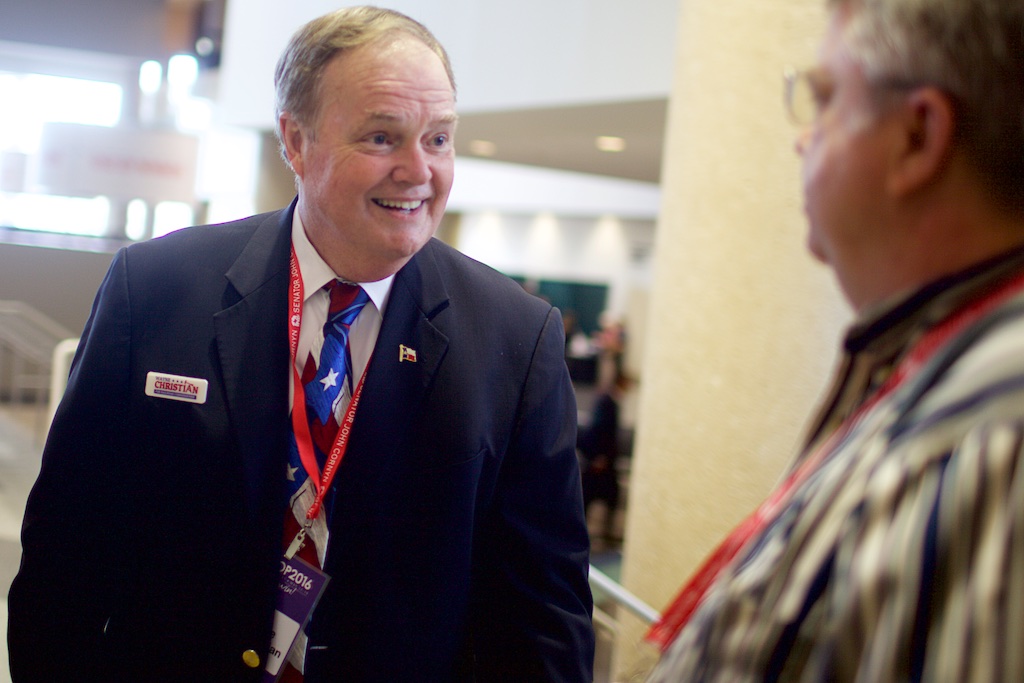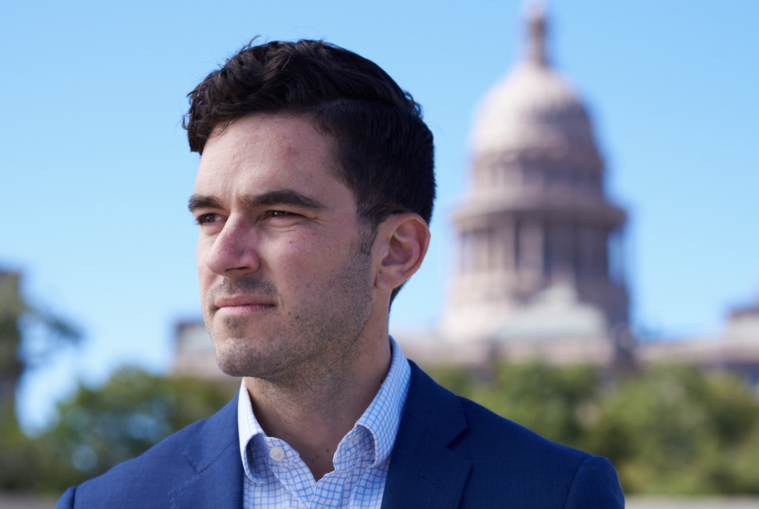The race for a seat on the Texas Railroad Commission is getting some long-overdue attention—for all the wrong reasons. One of three seats on the Commission, which oversees oil and gas extraction rather than the railroads in its name, is up for grabs, and the campaigns have been rife with political theater.
Republicans Tom Slocum, Sarah Stogner and Dawayne Tipton, and Democrat Luke Warford are running against incumbent Wayne Christian, a gospel singer and financial advisor turned politician. A fourth Republican, Marvin Summers, was also in the running. But on February 8, he died while on the campaign trail in Midland in a car crash with a tanker truck.
The latest stunt comes from Stogner, an oil and gas attorney from West Texas. As early voting got underway in the state’s primary elections last week, Stogner, known as “theunicornlawyer” on TikTok, posted a video of herself wearing nothing more than a cowboy hat, boots, underwear, and nipple pasties while perched atop an oil pump jack. As of now, the video has 135,000 views. If that isn’t enough to get your attention, the fight for the Commission seat is riddled with corruption.

Though this year’s race is unusually entertaining, Texans should pay attention to the substantive issues the Commission handles. The Commission has always been a major player in the state’s economy and environment because of its oversight of oil and gas. Over the past year, the agency has been criticized for its role in the state’s electricity blackouts during Winter Storm Uri as well as for half-hearted attempts to shore up grid reliability in the storm’s aftermath.
Texas established its Railroad Commission in 1891 to prevent monopolies in the railroad industry. Eventually, the legislature added fuel pipelines to the agency’s purview and handed off railroads to the Department of Transportation. Today, the Railroad Commission gives out permits for new oil and gas wells and pipelines and is meant to ensure companies follow state and federal rules on safety and pollution. The agency also regulates natural gas utilities, surface mining for coal and uranium, geothermal energy, and the growing field of carbon storage.
The agency’s work regularly touches on the lives of Texans who live in oil- and gas-producing areas, explained Carey King, a researcher at the University of Texas at Austin’s Energy Institute. But during last year’s winter storm, he said, the Commission’s decisions affected the lives of all Texans in a way that it never has before.
Christian, who was first elected to the Railroad Commission in 2016, has been a staunch opponent of federal regulation, particularly on climate change and environmental issues. Each of Christian’s challengers has expressed a desire to revamp the Railroad Commission. Stogner, Tipton and Warford have all called out Christian’s close financial ties to the oil and gas industries. To some extent, they all acknowledge the realities of climate change and the energy industry’s transition to renewables over fossil fuels.
A series of reports from the nonprofit organizations Commission Shift and Texans for Public Justice denounced the current commissioners for holding significant financial stakes in the industries they are supposed to be regulating. Current commissioners Christian, Christi Craddick, and Jim Wright have collectively received millions of dollars in campaign contributions from oil and gas companies, including ones with cases pending before the agency.
“All of the sitting commissioners have taken two-thirds of their campaign contributions from the same companies that they oversee,” said Virginia Palacios, the executive director of Commission Shift, which is dedicated solely to holding the Railroad Commission accountable. “There’s no restriction—any amount, at any time.”

In 2020, a company called High Roller Group proposed building a landfill near Midland to store waste from oil and gas drilling. The Railroad Commission’s own staff found that the site was too close to the Ogallala Aquifer, which provides drinking water for about 2 million people across eight states, and recommended that the commissioners deny the landfill a permit. But Christian voted for the project to go forward anyway. Three days later, he received a $100,000 campaign donation from the Higher Roller Group. Christian did not respond to an interview request for this story.
In fact, Sarah Stogner’s unorthodox video was a comment on what she calls “crony capitalism.” Stogner has made a point not to accept any campaign contributions, and said she’s only spent about $900 total on her campaign so far. “They said I needed money. [cry-laugh emoji] I have other assets,” Stogner wrote in her tweet sharing the video.
According to campaign finance reports filed with the Texas Ethics Commission, Christian has received more than $2 million in total donations since he first ran for Railroad Commissioner, including nearly $455,000 in 2021 alone. Slocum has received about $54,000 in donations. Tipton has only received about $7,000, and said he was focused on grassroots organizing and fundraising. Warford has received about $129,000, mostly in small contributions from individual people.
A January poll from the University of Houston asked registered voters who they would choose in the Republican primary election. Christian came in first place, with 9% of the people polled indicating they would vote for him. Stogner came in second place, with 5% of the votes. The vast majority of the 1,400 people polled, 74%, said they didn’t know whom they would vote for.
The other long-shot candidates in the Republican primary include Dawayne Tipton and Tom Slocum. Slocum is an oil and gas engineering consultant who, like Christian, wants to see less regulation and more fiscal conservatism at the Commission. Tipton has worked in the oil and gas industry both in Texas and abroad. He is running on a platform of holding the Railroad Commission accountable to landowners and everyday Texans.
“I’m proof of the Texas miracle that [if] you work hard, and you have a willingness to do what others won’t, you can go far in this life,” Tipton said. “I want to make sure that these jobs, and these opportunities are here for future generations.”
Whoever wins the Republican primary on March 1 will face Democrat Luke Warford in the November general election. Warford is betting his campaign on the issues of grid reliability and the global energy transition. “Everybody knows the world is changing,” he said. “We need somebody on the commission who has a vision about where our economy is going.”
Texas can still be an energy leader in the coming decades, Warford said, but he thinks many of the state’s future opportunities lying with geothermal, wind, and solar energy as well as with carbon capture and recycling the wastewater from oil and gas drilling. (Wastewater is currently injected underground, and has caused earthquakes in Texas in the past.)

In the meantime, Warford—along with Tipton and Stogner—have criticized the Commission for failing to act during and after Winter Storm Uri. All three candidates call for the agency to make the gas industry shore up its infrastructure as soon as possible.
“It’s so unconscionable,” Warford said, “that in the energy capital of the world in 2021, we literally couldn’t keep the lights on and people froze to death.”
The gas suppliers fall squarely under the Railroad Commission’s jurisdiction, according to King, Palacios, and other experts. In fact, the Commission could have started winterizing the gas supply chain back in 2011, when a similar winter storm hit the state, Palacios said, but chose not to.
The power outages happened due to a combination of frozen power plants and problems with the fuel supplies coming into those facilities. An investigation by the Federal Energy Regulatory Commission and the North American Electric Reliability Corporation found that natural gas suppliers and gas-fired power plants accounted for the majority of unplanned power outages, and recommended that both groups be required to insulate their equipment from freezing temperatures.
The Commission announced this January that it had finally inspected thousands of gas wells and pipelines, and found that 98 percent had been winterized. A recent investigation by NBC 5, however, revealed that although these operators said they were ready for winter, more than half were not using physical cold weather barriers or heating systems to protect their equipment. Most also had not tested or simulated any extreme weather preparedness procedures.
There’s not much officials can do about this, because the Commission has yet to set rules for winterizing gas wells and pipelines. Even once rules are in place, companies may be able to opt out by saying they aren’t “critical infrastructure” and paying a $150 fee.
There are plenty of other issues at hand as well. A major source of greenhouse gas emissions—not just carbon dioxide, but also the more potent methane—is the flaring, or venting straight to the atmosphere, of gas that comes out of oil wells as a byproduct of the drilling and fracking processes.
“You have literally thousands of permits to flare throughout Texas, and it’s increased over time,” said Cyrus Reed, the conservation director of the Sierra Club’s Lone Star Chapter. “If you just attend any Railroad Commission meeting, you’ll see that they grant exceptions, allowing companies to flare every single meeting.”
Additionally, more than 7,000 abandoned oil and gas wells across Texas need to be plugged, in a way that doesn’t lead to future blow-outs. The federal infrastructure bill signed by President Biden in November includes $4.7 billion in federal grants that state oil and gas regulators, including the Texas Railroad Commission, can use to plug these “orphan” wells.
Finally, there’s the matter of rising gas bills. During Winter Storm Uri, gas prices skyrocketed, and utilities couldn’t pay suppliers. After the immediate crisis passed, the Railroad Commission — which oversees gas utility rates — was responsible for approving an increase in ratepayers’ bills over the next 30 years to cover the utilities’ $3.4 billion debt.
It’s unclear how large this debt burden looms in voters’ minds, but the issues the Commission covers seem to be becoming more prevalent. At the heart of it all is the question of how to balance the various parts of the Railroad Commission’s mission: stewardship of natural resources and the environment, personal and community safety, and finally, development and economic vitality.
Historically, the Commission has been criticized for being “more of a promoter” of the oil and gas industries than a regulator, said Reed. But this year, even the incumbent’s Republican challengers are calling for the agency to answer to the people rather than to corporations.







